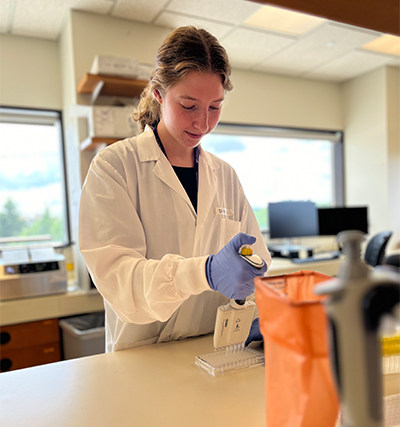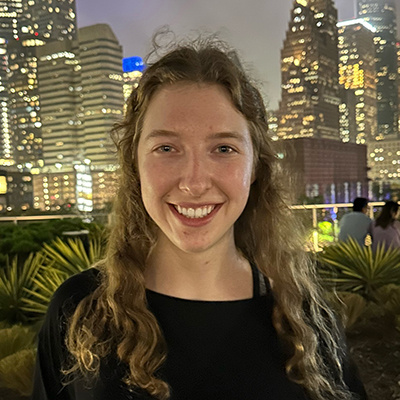
Diana Clark spent her summer researching a new method for treating cancer. In May, she traveled to Ottawa, Canada, on a 12-week Fulbright internship to study cancer-defeating natural killer (NK) cells, white blood cells that fight infection in the body.
While existing cellular therapies have shown results curing certain blood cancers, research shows that NK cell treatments may cause fewer side effects for patients.
Clark is working with a professor at the University of Ottawa, one of the leading labs in Canada investigating NK cell cancer therapy, which, though years away from clinical application, holds immense potential for the future.
A senior biological sciences major in the College of Arts and Sciences, Clark is also leaning into the public health aspect of her field and plans to become a physician.
She says the Fulbright research and other opportunities at USC “have helped me become better informed about what steps healthcare workers and public health officials can take toward promoting health equity and healthy populations both within the U.S. and abroad.”
Have microscope, will travel
The Fulbright research trip isn’t the first time Clark has traveled for science. Her freshman and sophomore years, she has conducted summer research at the Cincinnati Children’s Hospital, where she worked with bone marrow transplant patients to look at indicators of illness.
Her sophomore year, she took a Maymester course in Costa Rica to learn about global health, which she says broadened her understanding of cultural influences on health and gave her perspective beyond what she could get in the classroom.
This summer’s efforts, along with her time in Costa Rica, will give Clark the experience to jump into her honors thesis work investigating factors that influence the healthcare given to unaccompanied minors crossing the southern border.
“So many things happen before the child sees a physician that could hinder communication between the physician and the child,” Clark says.
As the child of immigrants to California – her father is from Scotland and her mother is from Canada – Clark was surrounded by diverse cultural influences. Her parents were also scientists, which means her passion for discovery runs in the family.
Clark will bring that passion back to USC this fall as she begins her senior year. Looking ahead, Clark plans to use the specialized skills and knowledge she’s gained at USC in her planned career in pediatric medicine.
But before applying to medical school, Clark plans to volunteer or teach in a Spanish-speaking country for a year after graduation.
“My experiences in research, traveling and growing outside of the classroom are good ways to prepare for a career as a physician,” Clark says, “and having quite a few different research experiences has helped me move outside of my comfort zone.”
